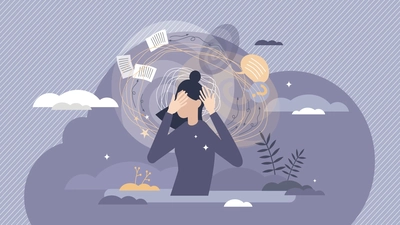
Anxiety is a common mental health issue that affects millions of people worldwide. While a certain level of anxiety is a normal part of life, excessive anxiety can interfere with daily activities and overall well-being. Understanding anxiety, recognizing its symptoms, and adopting effective management strategies are crucial steps toward maintaining good mental health.
Understanding Anxiety
Anxiety can be defined as a feeling of worry, fear, or apprehension about a future event or situation. Unlike stress, which usually has a specific cause and is often short-term, anxiety can be a persistent state that affects a person's thoughts, feelings, and behavior over time.
The Different Types of Anxiety Disorders
Anxiety is not a one-size-fits-all experience; it can manifest in various forms. Some common types of anxiety disorders include:
-
Generalized Anxiety Disorder (GAD): Characterized by excessive, uncontrollable worry about everyday issues, GAD can lead to restlessness, fatigue, difficulty concentrating, and sleep disturbances.
-
Panic Disorder: This involves recurrent panic attacks—sudden surges of intense fear or discomfort that peak within minutes. Symptoms may include heart palpitations, shortness of breath, dizziness, and feelings of impending doom.
-
Social Anxiety Disorder: This disorder involves an intense fear of social situations, leading individuals to avoid them altogether. It can manifest as a fear of embarrassing oneself or being judged by others.
-
Specific Phobias: These are irrational fears of specific objects or situations, such as heights, spiders, or flying. People with phobias go to great lengths to avoid their triggers.
-
Obsessive-Compulsive Disorder (OCD): OCD is characterized by obsessive thoughts and compulsive behaviors aimed at reducing anxiety. Individuals may engage in repetitive rituals to alleviate distress.
-
Post-Traumatic Stress Disorder (PTSD): Following a traumatic event, individuals may experience intrusive thoughts, flashbacks, and heightened anxiety.
Recognizing the Symptoms of Anxiety
Recognizing the symptoms of anxiety is the first step toward effective management. Anxiety can present in various ways, including:
- Emotional Symptoms: Persistent worry, fear, irritability, and difficulty concentrating.
- Physical Symptoms: Rapid heart rate, shortness of breath, sweating, trembling, headaches, and gastrointestinal issues.
- Behavioral Symptoms: Avoidance of anxiety-provoking situations, social withdrawal, and changes in sleep patterns.
It's important to remember that everyone's experience with anxiety is unique. Some people may experience a combination of these symptoms, while others may only exhibit a few.
The Causes of Anxiety
Anxiety can arise from a complex interplay of factors, including genetics, brain chemistry, personality traits, and life experiences. Some common contributors include:
-
Genetics: A family history of anxiety disorders may increase the likelihood of developing anxiety. Specific gene variations can influence brain chemistry and stress responses.
-
Brain Chemistry: Neurotransmitters, such as serotonin, norepinephrine, and gamma-aminobutyric acid (GABA), play a significant role in regulating mood and emotions. Imbalances in these chemicals can contribute to anxiety disorders.
-
Environmental Factors: Life stressors, such as trauma, abuse, loss of a loved one, or significant life changes, can trigger or exacerbate anxiety.
-
Personality Traits: Certain personality traits, such as being overly perfectionistic or having low self-esteem, can increase the risk of developing anxiety disorders.
-
Medical Conditions: Chronic illnesses, hormonal changes, or substance abuse can also contribute to anxiety symptoms.
The Importance of Recognizing Anxiety
Recognizing anxiety is essential for several reasons:
-
Early Intervention: Early recognition allows for timely intervention, significantly improving outcomes.
-
Reduction of Suffering: Understanding anxiety can help individuals alleviate unnecessary suffering and better cope with their emotions.
-
Increased Awareness: Recognizing anxiety encourages conversations about mental health and reduces stigma, promoting a more supportive environment.
When to Seek Help
If anxiety becomes overwhelming or hinders daily functioning, it is crucial to seek professional help. Some indicators that you may need assistance include:
- Persistent anxiety that lasts for months.
- Difficulty performing work or social activities.
- Physical symptoms that interfere with daily life.
- Coping mechanisms that involve substance use.
Consulting a mental health professional can provide clarity and reassurance, guiding individuals towards appropriate treatment options.

Managing Anxiety Effectively
Understanding anxiety is only half the battle; effective management is key to improving quality of life. Here are some proven strategies and techniques to help manage anxiety:
1. Psychotherapy
Psychotherapy, or talk therapy, is one of the most effective treatments for anxiety disorders. Several approaches can be beneficial:
-
Cognitive-Behavioral Therapy (CBT): CBT focuses on identifying and changing negative thought patterns and behaviors associated with anxiety. It helps individuals develop coping strategies and problem-solving skills.
-
Exposure Therapy: This form of therapy gradually exposes individuals to anxiety-provoking situations, helping them desensitize and build resilience.
-
Acceptance and Commitment Therapy (ACT): ACT encourages individuals to accept their thoughts and feelings rather than fighting or avoiding them. This approach promotes mindfulness and values-based living.
2. Medication
In some cases, medication may be necessary to manage anxiety symptoms. Common medications include:
-
Antidepressants: Selective serotonin reuptake inhibitors (SSRIs) and serotonin-norepinephrine reuptake inhibitors (SNRIs) are often prescribed to treat anxiety disorders.
-
Benzodiazepines: These medications can provide short-term relief for acute anxiety but are generally not recommended for long-term use due to the risk of dependency.
-
Beta-Blockers: Often used for performance anxiety, beta-blockers can help control physical symptoms such as rapid heartbeat and tremors.
Medication should always be prescribed and monitored by a qualified healthcare provider.
3. Lifestyle Changes
Making positive lifestyle changes can significantly impact anxiety management. Consider the following:
-
Regular Physical Activity: Exercise is a natural stress reliever. Aim for at least 30 minutes of moderate aerobic exercise most days of the week.
-
Healthy Eating: A balanced diet rich in whole foods, fruits, vegetables, and whole grains can positively affect mental health. Omega-3 fatty acids found in fatty fish and nuts have been associated with reduced anxiety.
-
Adequate Sleep: Prioritize sleep hygiene to improve sleep quality. Aim for 7 to 9 hours of restful sleep each night.
4. Mindfulness and Relaxation Techniques
Mindfulness practices and relaxation techniques can help reduce anxiety and improve emotional regulation.
-
Mindfulness Meditation: This practice encourages individuals to focus on the present moment, observing thoughts and feelings without judgment. Mindfulness meditation has been shown to reduce anxiety symptoms.
-
Deep Breathing Exercises: Deep breathing helps activate the body's relaxation response. Try inhaling deeply through your nose, holding for a few seconds, and exhaling slowly through your mouth.
-
Progressive Muscle Relaxation: This technique involves tensing and relaxing muscle groups throughout the body, promoting physical relaxation and reducing tension.
5. Connecting with Others
Strong social connections can provide support and help reduce feelings of isolation. Consider the following:
-
Talk About Your Feelings: Sharing your thoughts and emotions with trusted friends or family members can provide relief and perspective.
-
Join Support Groups: Support groups offer a safe space for individuals with similar experiences to connect, share coping strategies, and provide mutual support.
-
Spend Time with Loved Ones: Engage in social activities that bring joy and comfort, even if it's simply spending time with family or friends.
6. Limiting Stimulants and Substances
Caffeine, nicotine, and alcohol can exacerbate anxiety symptoms. Consider reducing or eliminating these substances to promote better mental health.
-
Caffeine: Monitor your caffeine intake, and consider switching to herbal teas or decaffeinated beverages.
-
Nicotine: If you smoke, seek help to quit. Smoking may temporarily reduce anxiety but ultimately increases it over time.
-
Alcohol: While alcohol may seem like a way to relax, it can worsen anxiety symptoms long-term. Practice moderation and be mindful of your consumption.
7. Establishing a Routine
Creating a daily routine can provide structure and stability, reducing feelings of uncertainty and anxiety. Establish regular times for meals, exercise, work, and relaxation.
8. Set Realistic Goals
Setting achievable goals can help build a sense of accomplishment. Break larger tasks into smaller, manageable steps and celebrate your progress along the way.
Conclusion
Anxiety is a prevalent mental health issue that affects individuals across various demographics. Recognizing the signs and symptoms of anxiety is critical for effective management. Through psychotherapy, medication, lifestyle changes, mindfulness practices, and strong social connections, individuals can take significant steps toward managing anxiety and improving their overall mental health.
Remember that seeking help is a sign of strength, not weakness. If you or someone you know is struggling with anxiety, don’t hesitate to reach out for professional support. With the right tools and strategies, it is possible to manage anxiety effectively and lead a fulfilling life.



